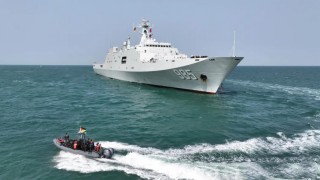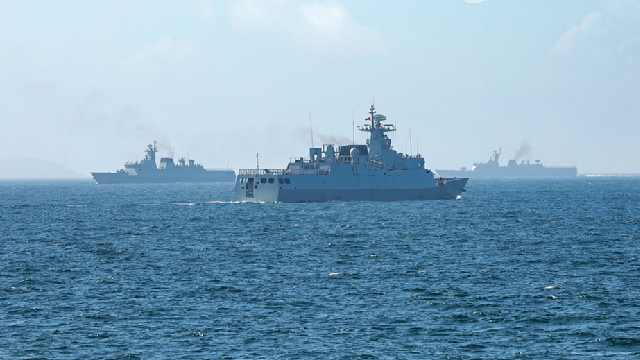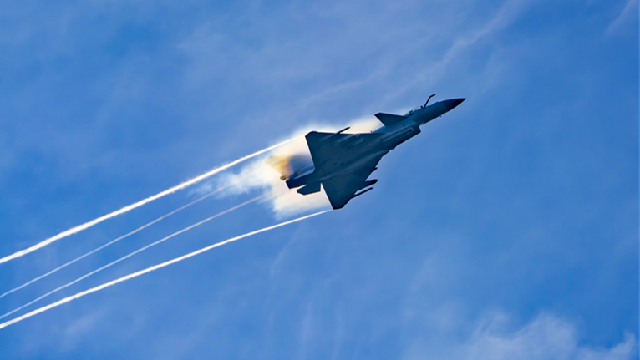
NATO eyes expansion into the Arctic. Cartoon: Vitaly Podvitski
In the Arctic, where no trouble exists, the US busies itself with imagined concerns. The US' most skilled trick is to "cry wolf" in peaceful regions, especially when promoting the "China threat theory." The US' ultimate goal is to become the hegemonic power in every region of the world.
The 2024 Arctic Strategy released by the US Department of Defense states that "The People's Republic of China (PRC), which remains DOD's pacing challenge, seeks increasing access and influence in the Arctic." The cooperation between China and another "threat" - Russia - has "implications for the security of the US and our allies and partners." Therefore, the US believes that Finland and Sweden joining NATO is historic, bringing all like-minded Arctic states into NATO and providing and presenting new opportunities for collaboration and cooperation. In short, the US is demonizing China and Russia, forming alliances to dominate the Arctic.
"The Arctic will become one of the most important global energy channels in the future," said Li Haidong, a professor at China Foreign Affairs University. The 2024 Arctic Strategy mentions that "the Arctic may experience its first practically ice-free summer by 2030, and the loss of sea ice will increase the viability of Arctic maritime transit routes and access to undersea resources."
The warning issued by the US about the China and Russia threat in the Arctic is also because it fears that China and Russia will completely control the Arctic, a key future global energy channel, weakening the US' hegemonic position in the overall global strategy. The Arctic region is also an important area for the US to strengthen alliances through creating crises and chaos, which it cannot overlook, Li added.
From the perspective of energy development, and military strategy, the Arctic has a fatal attraction for the US, and its hegemonic power cannot ignore the Arctic.
The US, plagued by internal problems, does not have enough energy to face several global challenges, including the Arctic. Therefore, the US chooses to seek more allies who can "work" for its hegemonic power. Since Finland and Sweden joined NATO, except for Russia, the other seven countries of the Arctic Council are all NATO members. "The US wants to confront Russia through the other seven Arctic Council member countries, so the US is worried that China will help Russia confront them," a military expert told the Global Times. The US wants to share responsibility and risks, and ultimately achieve global hegemony.
However, this global hegemon shamelessly hides its selfish motives behind a seemingly "noble" purpose.
The US Deputy Secretary of Defense Kathleen Hick said, "Our Arctic strategy will guide the Department's efforts to ensure that the Arctic remains a secure and stable region." The Pentagon's report also states that US forces "must be ready and equipped to mitigate the risks associated with potential contingencies in the Arctic."
In fact, the US' increasing presence in the Arctic is strengthening the likelihood of conflicts in the region. This is a form of rhetoric used to reduce the likelihood of conflict through words but enhance its presence in the region. For the US, the more conflicts there are, the stronger its alliance system. Regional competition crises are in line with the US hegemonic strategic needs. The US has always prioritized its hegemonic demands over the security interests of other countries and regions, a stance it has never changed.
China's research in the Arctic and cooperation with Russia have never had any exclusive arrangements with undisclosed purposes, nor have they been linked to military security. Currently, Chinese companies have become important shareholders in Russian Arctic energy and infrastructure construction, waterway development and utilization, scientific research, and exploration. Looking at the initial achievements of China-Russia Arctic cooperation, both sides have been promoting it according to market-oriented and transparent standards. China's Arctic Policy in 2018 has long been clear, emphasizing that "China's policy goals on the Arctic are: to understand, protect, develop and participate in the governance of the Arctic, so as to safeguard the common interests of all countries and the international community in the Arctic, and promote sustainable development of the Arctic."
China and Russia's cooperation should not and will not be affected by the hysteria of hegemonic countries. Instead, all reasonable cooperation between China and Russia will be viewed by the US as a "threat."
The Arctic's climate, environment, and ecosystem are ultimately challenges faced by all countries in the world, and the global challenges will not slow down or weaken due to geopolitical struggles in some countries. Instead of fabricating a "China and Russia threat in the Arctic," it is better to focus on how to govern the Arctic. The Arctic belongs to the whole world, not to any one or a few countries as a private garden.









